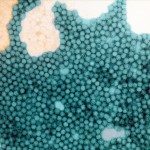Lien vers Pubmed [PMID] – 18060590
Arch. Virol. 2008;153(3):409-16
Virological surveillance is an important element in the Polio Eradication Initiative to provide information rapidly about circulating wild polioviruses. Molecular tools have been developed to identify the serotype of the poliovirus strains and whether they are of vaccine or wild origin (intratypic differentiation) and to perform the molecular epidemiology of wild strains. The main objective of this study was to show that restriction fragment length polymorphism (RFLP) is a tool that can be used for molecular epidemiology of wild polioviruses. This is retrospective study of poliovirus type 1 strains received at the Institut Pasteur of Bangui (IPB), a WHO Regional Reference Laboratory for Africa, since 1994. We describe our experience with isolates from Western and Central Africa and show a positive correlation between the genotypes as determined by sequencing the gene for the VP1 capsid protein and the RFLP patterns. Although genomic sequencing is the gold standard method for detailed molecular epidemiology analysis of poliovirus isolates, these results show that RFLP is a potentially valuable tool for molecular epidemiological analysis of poliovirus type 1 strains: it could be used by many laboratories as a rapid method for ITD and genotype screening where sequencing capacity is not readily available.


